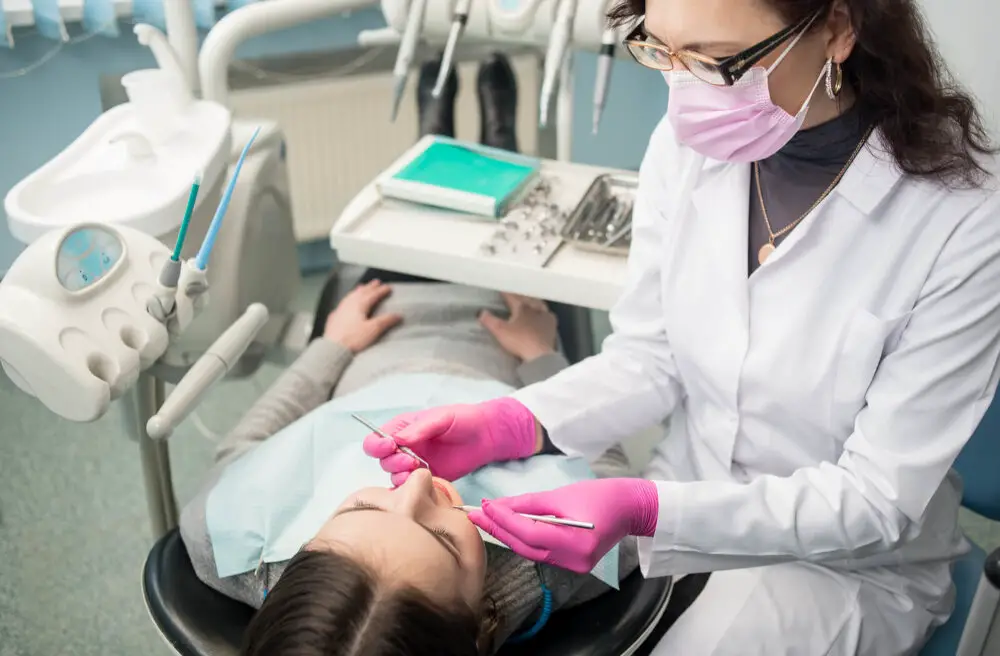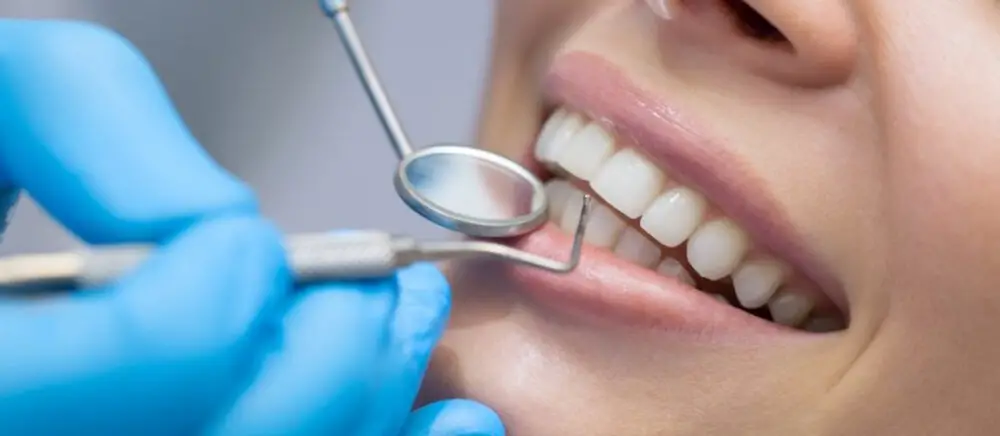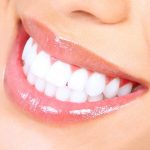Why Does My Teeth Hurt When I Eat? Common Causes and Remedies

It is not uncommon to experience tooth pain while eating, which can be a frustrating and uncomfortable experience. Tooth pain can be caused by a variety of factors, ranging from minor issues like sensitivity to more serious conditions such as tooth decay or gum disease. Understanding the root cause of your tooth pain is essential to finding the right remedy and preventing further damage to your teeth. One of the most common causes of tooth pain when eating is tooth sensitivity. This condition occurs when the enamel on your teeth wears down, exposing the more sensitive inner layers. This can be caused by a number of factors, including consuming acidic foods and drinks, over-brushing your teeth, or grinding your teeth at night. Fortunately, there are several remedies available for tooth sensitivity, including desensitizing toothpaste and fluoride treatments. In more severe cases, your dentist may recommend bonding or a crown to protect the affected tooth.
Teeth sensitivity is a common dental problem that affects many people. It is characterized by a sharp, shooting pain in the teeth, usually in response to hot or cold temperatures, sweet or sour foods, and even breathing cold air. The sensitivity is caused by the exposure of the dentin layer of the tooth, which is the layer beneath the enamel. This can happen due to several reasons, such as tooth decay, gum recession, enamel erosion, or teeth grinding. The dentin contains microscopic tubules that lead to the nerve endings in the pulp of the tooth, which is why any stimulation of the dentin can trigger pain. Remedies for teeth sensitivity include using desensitizing toothpaste, avoiding acidic foods and drinks, using a soft-bristled toothbrush, and seeking professional dental treatment.
It is crucial to seek dental advice when experiencing tooth pain while eating, as it may indicate an underlying dental problem. Ignoring tooth pain can lead to further complications, such as tooth loss and gum disease. Seeking dental advice can help diagnose the cause of the pain and prevent it from worsening. Moreover, dental professionals can recommend appropriate remedies to alleviate the pain and prevent dental problems from occurring in the future. Therefore, it is essential to prioritize dental health by seeking professional advice on any dental issues, including tooth pain while eating.
Tooth Decay

Tooth decay is a common dental problem that occurs when the enamel of the teeth breaks down due to the accumulation of plaque. Plaque is a sticky, colorless film of bacteria that forms on the teeth and gums. When we eat sugary or starchy foods, the bacteria in plaque convert them into acid, which attacks the enamel of the teeth. Over time, this acid erosion can lead to cavities, which are small holes in the teeth that can cause pain, sensitivity, and even infection. Tooth decay can also cause bad breath, discolored teeth, and a rough or pitted texture on the tooth surface. To prevent tooth decay, it is important to maintain good oral hygiene habits such as brushing twice a day with fluoride toothpaste, flossing daily, and using an antiseptic mouthwash. A healthy diet that is low in sugar and high in calcium and vitamin D can also help to strengthen teeth and prevent decay. Regular dental check-ups and cleanings can detect tooth decay early, before it becomes a more serious problem. If you do develop a cavity, your dentist can fill it with a dental filling or crown to restore the tooth’s structure and function. With proper care and attention, you can keep your teeth healthy and pain-free for years to come.
Tooth decay, also known as dental caries, is a common dental problem caused by the breakdown of tooth enamel due to the activity of bacteria in the mouth. When we eat or drink, the bacteria in our mouth mix with the sugars and starches present in our food, forming a sticky film called plaque. The acid produced by the bacteria in plaque damages the tooth enamel, leading to the formation of cavities. Poor oral hygiene practices, such as infrequent brushing and flossing, can increase the risk of tooth decay. Other factors, such as frequent snacking, sugary and acidic foods, and dry mouth, can also contribute to the development of tooth decay. If left untreated, tooth decay can cause severe pain, infection, and even tooth loss, highlighting the importance of good oral hygiene habits and regular dental check-ups.
Tooth decay is a common dental problem that affects people of all ages. Some of the symptoms of tooth decay include sensitivity to hot and cold temperatures, sharp pain when biting or chewing, visible holes or dark spots on the teeth, and bad breath. In advanced cases, tooth decay can also cause swelling and pus around the affected tooth. If left untreated, tooth decay can lead to tooth loss and other serious dental problems. Regular dental check-ups and proper oral hygiene are essential in preventing and treating tooth decay.
There are several treatment options available for tooth pain depending on the underlying cause. If the pain is due to a cavity, a dental filling may be necessary to restore the tooth. For more severe cases of decay, a root canal may be required. If the pain is caused by gum disease, a deep cleaning or scaling and root planing may be recommended. In cases where tooth sensitivity is the issue, desensitizing toothpaste or fluoride treatments can be effective. Additionally, over-the-counter pain relievers such as ibuprofen or acetaminophen can provide temporary relief. It is important to consult with a dentist to determine the best course of treatment for your specific situation.
Gum Disease

Gum disease, also known as periodontal disease, is a common dental issue that affects millions of people worldwide. It is caused by the buildup of plaque and bacteria on the teeth and gums, leading to inflammation, bleeding, and eventual tooth loss if left untreated. Gum disease can often go unnoticed in its early stages, but as it progresses, it can cause significant pain and discomfort when eating, brushing, or flossing. Symptoms of gum disease include swollen, tender, or bleeding gums, bad breath, loose teeth, and receding gums. There are several ways to prevent and treat gum disease, including practicing good oral hygiene, such as brushing twice a day, flossing daily, and using mouthwash. Regular dental checkups and cleanings are also essential to detect and treat gum disease early on. In more severe cases, your dentist may recommend scaling and root planing, a deep cleaning procedure that removes plaque and tartar from the teeth and gums. In some cases, antibiotics may be prescribed to treat the infection. If you are experiencing symptoms of gum disease, it’s important to seek treatment as soon as possible to prevent further damage to your teeth and gums.
Gum disease, also known as periodontal disease, is a bacterial infection that affects the tissues and bones that support teeth. It is caused by the buildup of plaque, a sticky film of bacteria that forms on teeth and gums. If left untreated, gum disease can lead to tooth loss and other serious health problems. Symptoms of gum disease include red, swollen and bleeding gums, bad breath, receding gums, and loose teeth. Treatment options for gum disease include professional cleanings, medications, and in severe cases, surgery. Good oral hygiene practices, such as brushing and flossing regularly, can help prevent gum disease from developing.
Gum disease, also known as gingivitis or periodontitis, is a common dental problem that affects many people. The symptoms of gum disease may vary from person to person, but some common signs include swollen, tender, or bleeding gums, bad breath, receding gums, loose teeth, and changes in bite alignment. If left untreated, gum disease can lead to more serious dental problems, such as tooth loss, abscesses, and bone loss. Maintaining good oral hygiene, eating a healthy diet, and visiting the dentist regularly can help prevent and treat gum disease.
There are several treatment options available if you experience tooth pain while eating. The type of treatment will depend on the underlying cause of the pain. If the pain is due to tooth decay or a cavity, a filling or root canal may be necessary. For those with gum disease, a deep cleaning or scaling and root planing may be recommended. If the pain is caused by teeth grinding, a mouthguard may be prescribed. In some cases, a simple over-the-counter pain reliever may be enough to alleviate the discomfort. It’s important to consult with a dentist to determine the best treatment option for your specific situation.
Teeth Grinding

Teeth grinding, also known as bruxism, is a common condition that is often caused by stress and anxiety. Many people grind their teeth without even realizing it, especially during sleep. Over time, it can lead to tooth damage, jaw pain, headaches, and even earaches. In some cases, it can also cause tooth sensitivity, making it painful to eat or drink certain foods and beverages. If left untreated, teeth grinding can even lead to tooth loss, as the constant grinding can wear down the enamel and cause the teeth to become loose. Fortunately, there are several remedies for teeth grinding that can help alleviate the symptoms. One of the most effective remedies is to reduce stress and anxiety levels, as these are often the root causes of bruxism. Relaxation techniques like deep breathing, yoga, and meditation can be helpful in reducing stress and anxiety levels. Additionally, wearing a mouthguard at night can help protect the teeth from further damage and relieve jaw pain. In some cases, medication may be prescribed to help relax the muscles and prevent teeth grinding. If you think you may be suffering from teeth grinding, it’s important to speak with your dentist or healthcare provider to determine the underlying cause and develop an appropriate treatment plan.
Teeth grinding, also known as bruxism, is a common condition where a person clenches or grinds their teeth unconsciously, mostly during sleep. The causes of teeth grinding are not fully understood, but it is often related to stress and anxiety. Other factors that may contribute to bruxism include misaligned teeth, sleep disorders, and certain medications. The symptoms of teeth grinding include headaches, jaw pain, worn-down teeth, and earaches. To prevent teeth grinding, it is recommended to reduce stress and anxiety through relaxation techniques, avoid caffeine and alcohol, and wear a mouthguard while sleeping to protect the teeth.
Teeth grinding, also known as bruxism, is a common problem that can cause a variety of symptoms. These symptoms may include headaches, jaw pain, and earaches, which can be uncomfortable and disruptive to daily life. In addition, teeth grinding can cause tooth sensitivity, cracked or chipped teeth, and even tooth loss if left untreated. Some people may also experience facial muscle pain, difficulty sleeping, and TMJ disorders. If you experience any of these symptoms, it is important to seek dental care to address the underlying cause of your teeth grinding and prevent further damage to your teeth and oral health.
There are several treatment options available for tooth pain, depending on the underlying cause. For cavities or decay, a filling or root canal may be necessary to remove the damaged tissue and restore the tooth’s structure. Gum disease can be treated with a deep cleaning or antibiotics, while a cracked or broken tooth may require a crown or extraction. Over-the-counter pain relievers like ibuprofen can help manage discomfort in the meantime. It is important to see a dentist if you experience persistent tooth pain, as untreated issues can worsen and lead to more serious problems.
Dental Procedures

Dental procedures are medical treatments that are carried out to improve or restore the oral health of an individual. These procedures are performed by qualified dental professionals who specialize in diagnosing and treating dental conditions. Some of the most common dental procedures include teeth cleaning, fillings, crowns, and root canal therapy. These procedures are designed to address a wide range of dental issues, including tooth decay, gum disease, and tooth loss. Depending on the nature and severity of the dental problem, different procedures may be recommended. For instance, tooth decay may be treated with a simple filling, while more severe cases may require a root canal or extraction. Regardless of the procedure, dental professionals prioritize patient comfort and safety, utilizing state-of-the-art equipment and techniques to ensure a successful outcome. One important aspect of dental procedures is their preventive nature. Regular dental check-ups and cleanings can help to identify and address dental problems before they become more serious issues. In addition, dental professionals may recommend specific procedures to prevent future problems, such as sealants for children’s teeth or gum disease treatments for adults. Overall, dental procedures play a critical role in maintaining optimal oral health and preventing more significant health problems down the line. By working with a qualified dental professional and following recommended treatment plans, individuals can enjoy strong, healthy teeth and gums for years to come.
Common dental procedures that may cause sensitivity include teeth whitening, dental fillings, and root canal treatment. Teeth whitening involves the use of chemicals to remove stains and discolorations from the teeth, which can cause temporary sensitivity. Dental fillings involve the removal of decayed or damaged tooth material and filling the cavity with a restorative material. The process can cause sensitivity due to the removal of the tooth’s protective layer. Root canal treatment involves removing infected or damaged tissue from the tooth’s pulp and filling it with a restorative material. The procedure can cause sensitivity due to the removal of the tooth’s nerve tissue. It is important to discuss any potential side effects or risks with your dentist before undergoing any dental procedure.
After a dental procedure, it is not uncommon to experience sensitivity in your teeth. This can manifest in different ways, such as a sharp pain when you consume hot or cold foods or drinks, a dull ache that lingers even after you’ve finished eating, or discomfort when biting down on something hard. Sensitivity can also be triggered by sweet or acidic foods. You may notice that your teeth feel more sensitive to the touch, or that your gums are tender and swollen. These symptoms can range from mild to severe, and may last for a few days or several weeks depending on the cause of the sensitivity and the treatment used to address it.
There are several treatment options available for teeth sensitivity. The most common and effective treatment is the use of desensitizing toothpaste, which contains compounds that block the pain sensation from reaching the nerve of the tooth. Another option is applying fluoride gel or varnish to the teeth, which helps to strengthen the enamel and reduce sensitivity. In more severe cases, a dentist may recommend a dental filling, crown, or root canal therapy to address the underlying issue causing the sensitivity. It is important to seek professional advice from a dentist to determine the best treatment option for your specific case of teeth sensitivity.
Teeth sensitivity is a common and painful dental problem that affects many people when eating. There are various causes of this condition, including tooth decay, gum disease, exposed tooth roots, worn enamel, and teeth grinding. Tooth decay and gum disease can cause the erosion of the protective layers of the teeth, exposing the nerve endings, leading to sensitivity. Similarly, when tooth roots are exposed due to gum recession, they become vulnerable to temperature changes, causing pain. Worn enamel, caused by brushing too hard or consuming acidic foods and drinks, can also expose the dentin and cause sensitivity. Finally, teeth grinding can wear down the enamel and expose the sensitive layers of the teeth. Proper oral hygiene, avoiding acidic food and drinks, and using desensitizing toothpaste can alleviate teeth sensitivity.
Seeking dental advice is crucial if you experience any kind of dental discomfort. Ignoring dental pain may lead to more severe problems and can cause permanent damage to your teeth. The causes of dental pain can vary from tooth decay, gum disease, cracked teeth, or even sinus infections. Only a qualified dental professional can diagnose the underlying issue and provide appropriate treatment. Regular visits to the dentist can help prevent dental problems from occurring in the first place and help maintain good oral health. Therefore, seeking dental advice is essential to maintain healthy teeth and gums and prevent further complications.
Teeth sensitivity is a common dental problem that affects many people. To prevent it, there are several preventative measures that can be taken. First, maintaining good oral hygiene by brushing twice a day with a soft-bristled toothbrush and fluoride toothpaste can help prevent sensitivity caused by tooth decay or gum disease. Avoiding acidic foods and drinks, such as citrus fruits and carbonated beverages, can also reduce sensitivity. Using a mouthguard while playing sports or grinding your teeth can prevent sensitivity caused by trauma or wear. Additionally, regular dental checkups and cleanings can help identify and treat any potential issues before they become more serious. By taking these preventative measures, you can help keep your teeth healthy and free from sensitivity.
Conclusion

In conclusion, experiencing tooth pain during meals can be a frustrating and uncomfortable experience. However, it is important to understand that there are several common causes of this issue, including tooth decay, gum disease, and tooth sensitivity. By identifying the root cause of your tooth pain, you can take proactive steps to alleviate the discomfort. This can include practicing good oral hygiene, using desensitizing toothpaste, or seeking professional dental treatment. Remember, taking care of your teeth is a crucial part of maintaining overall health and well-being, so don’t hesitate to address any dental concerns you may have.







